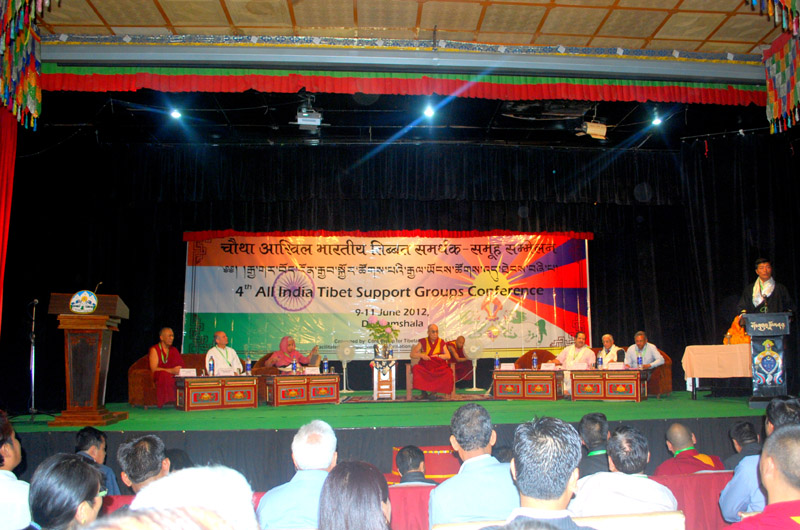 Dharamshala: The Fourth All India Tibet Support Groups Conference began on the 9th of June in McLeod Ganj at the Tibet Institute of Performing Arts (TIPA).
Dharamshala: The Fourth All India Tibet Support Groups Conference began on the 9th of June in McLeod Ganj at the Tibet Institute of Performing Arts (TIPA).
The conference has set to hold sessions wherein eminent panelists will speak about a wide range of issues and problems that are currently being faced in Tibet. Among the people present at the conference were Kalon Tripa Dr Lobsang Sangay, Mrs Chandresh Kumari, Member of Parliament, Lok Sabha and His Holiness the Dalai Lama. The conference is being held from the 9th till the 11th of June.
The Panelists include Ms Dicki Chhoyang, Kalon for the Department of Information and International Relations of the Central Tibetan Administration and Mr Lalit Mansingh, former Foreign Secretary of India.
Mr Vijay Kranti, master of ceremonies, began by outlining the Tibetan cause. He spoke of a need for the Tibetan people to emulate their leader His Holiness the Dalai Lama. Asserted a need for Indo-Tibetan Co-operation and hoped that this conference would do exactly that.
The conference was inaugurated the lighting of the Chhomey (lamp).
This was followed by speech by Mr Ajay Singh Mankotia, Head of the Indo-Tibet Friendship association who like Mr Kranti restated a need to have joint action by Tibetans and Indians to resolve the Tibet issue. He requested all the Tibetan people to educate all present about the repressive Chinese regime especially those who had limited knowledge about the Tibetan cause.
Dr N.K. Trikha, National Convenor, Core Group for Tibetan Cause spoke about the China's empty promises. He said this was especially true during the run up to the 2008 Beijing Olympics. He then briefly outlined the issues that are likely to be discussed during the conference.
Mr Indresh Kumar was the next speaker and he was able to convey the methods used by the Tibetans against the Chinese regime. He said that the Tibet movement is moving into a new phase. He also spoke about how the cases of self-immolation were the greatest examples of self sacrifice for such a noble cause. He further emphasized a need to spread the movement more and recruit more people to help the cause.
The guest of honour Mrs Candresh Kumari, Member of Parliament, Lok Sabha gave a brief history of the mass exodus that followed after the Chinese government took over Tibet. She commended His Holiness the Dalai Lama for bringing the Tibetan issue to the world stage.
This was finally followed by the keynote address by the Kalon Tripa Dr Lobsang Sangay. He thanked the people in attendance. He reiterated the support that India has given Tibet for the past 50 years. He quoted the Dalai Lama who considers India the teachers of Tibet. He said "joint movement with India will let us return to our homeland". His speech was littered with how India and Tibet is a partnership that needs to continue the way it always has. I beautifully crafted speech which subtly implied on how India should take a firmer stand against China. Although India has done so, it needs to be more globally vocal.
The inaugural address by the Chief guest His Holiness the Dalai Lama. He was a little late to the conference as he was holding a prayer meeting at the Buddhist temple. He began his speech with his emphasis on how India is the teacher of Tibet. Religion and Tibetan history was much part of his speech, despite this he was able to bring the subject into a modern understanding. Through this brief history lesson he showed how India and Tibet have been so close for centuries and this is not a recent friendship.
Lama Choepal Zotpa ended proceedings with a vote of thanks and declared the conference ready to begin.
The conference had set very clear cut issues. The deliberation in a public forum such as this will give an opportunity for many to create a constructive system to improve the workings of the Tibetan movement. The sessions for the day were to deliberate on five issues; -
1) The Present Situation in Tibet and exile
2) Tibet and Sino-Indian Relations
3) Current Human Rights Situation in Tibet
4) Tibet's Fragile Eco-System and its Impact on Neighbouring Countries
5) Review on the progress of activities of Indian Tibet Support Group Conference Since 2009
The second day on the 10th of June will consist of all the participants be divided into 3 separate working groups following certain allotted themes. They will present and discuss their work the same day.
The final day will be sixth and final plenary session which will be the ‘Adoption of the Declaration and the Action Plan.'
The conference is aimed at bringing Indo-Tibet relations even closer. India also has a very negative view of China since many border incursions have taken place over the last few years. The conference aims to bring good policy making to the table as well as creating awareness among young Tibetans who have not seen their native land.


![Tibet has a rich history as a sovereign nation until the 1950s when it was invaded by China. [Photo: File]](/images/stories/Pics-2024/March/Tibet-Nation-1940s.jpg#joomlaImage://local-images/stories/Pics-2024/March/Tibet-Nation-1940s.jpg?width=1489&height=878)















